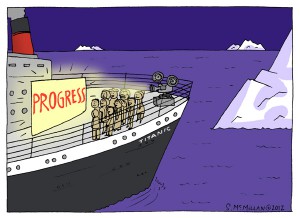The Titanic Code
by Dave Gardner
 One hundred years ago April 15, the Titanic disappeared beneath the icy waters of the North Atlantic. Several have marked this anniversary by noting the similarities between the Titanic and human civilization. In Titanic: The Final Word with James Cameron, on the National Geographic channel, James Cameron, director of the blockbuster film, Titanic, aptly turned the event into metaphor:
One hundred years ago April 15, the Titanic disappeared beneath the icy waters of the North Atlantic. Several have marked this anniversary by noting the similarities between the Titanic and human civilization. In Titanic: The Final Word with James Cameron, on the National Geographic channel, James Cameron, director of the blockbuster film, Titanic, aptly turned the event into metaphor:
Part of the Titanic parable is of arrogance, of hubris, of the sense that we’re too big to fail. There was this big machine, this human system, that was pushing forward with so much momentum that it couldn’t turn, it couldn’t stop in time to avert a disaster. And that’s what we have right now. We can’t turn because of the momentum of the system, the political momentum, the business momentum.*
The metaphor is remarkably apt, as the size of the Titanic meant it was not nimble. It could not stop or turn on a dime. The captain needed to look far ahead on the horizon and plan ahead. Doesn’t that sound like the predicament in which civilization finds itself? We have built up an increasingly complex system, and it is a ginormous one (7 billion served), touching all corners of the planet. It’s impossible to change overnight. And looking ahead with only a short time-horizon serves it very poorly.
 There’s something else keeping us from changing course, however. It is lack of desire. Our culture is not interested in a course correction because we’re distracted. We don’t see the iceberg ahead because we’re fixated on a cultural story that defines progress as growth, and growth as progress. This worldview has led us to develop a system that depends on everlasting growth.
There’s something else keeping us from changing course, however. It is lack of desire. Our culture is not interested in a course correction because we’re distracted. We don’t see the iceberg ahead because we’re fixated on a cultural story that defines progress as growth, and growth as progress. This worldview has led us to develop a system that depends on everlasting growth.
Fortunately, when Mother Nature says, “enough,” key parts of the system begin to fail. I say fortunately because it’s hard to argue with success. As long as this system appears to be serving most of us well, we are not likely to throw it out. The failure of the system, which we’ve begun to experience, is our best hope for motivation to get moving toward a more enlightened arrangement.
| “We’ve written a narrative that was fine in the nineteenth century. It served us well through much of the twentieth century… but it’s outdated. And we now need a new cultural narrative.”
— William Rees, ecological economist, in GrowthBusters |
In the documentary, GrowthBusters, I refer to perpetual growth as our “operating system,” comparing it to Windows or Mac OS. The belief, the dependence on, and the pursuit of growth are what we’re all about. It’s the computer code that manages everything we do. Many call it our cultural narrative. If we were on the bridge of the Titanic, it would be in our charts, affecting our compass, on our radar. It informs (or misinforms) everything we do.
 Without a doubt there are economists, sociologists and activists developing patches for this growth-based operating system. There are also scientists and activists developing apps that help us lighten our load on the planet. Renewable energy, water and land conservation, permaculture, and transit-oriented development are all examples of what I would call improved software applications, but they are still written to run on our old, growth-based operating system. With a system committed to everlasting growth, they will not keep our civilization from running off a cliff.
Without a doubt there are economists, sociologists and activists developing patches for this growth-based operating system. There are also scientists and activists developing apps that help us lighten our load on the planet. Renewable energy, water and land conservation, permaculture, and transit-oriented development are all examples of what I would call improved software applications, but they are still written to run on our old, growth-based operating system. With a system committed to everlasting growth, they will not keep our civilization from running off a cliff.
This is not to disparage them; it is to keep us from relaxing, thinking they will enable our civilization to become sustainable. They can be meaningful parts of a completely new system. But we do have to throw out the old system and start with fresh computer code. Upgrading from Windows 7 to Windows 2013 won’t do — Windows has to go.
| “Only the prospect of worldwide mind-change gives me hope for the future.”
— Daniel Quinn, author of Ishmael |
Changing our cultural narrative is a tall order. In my film, Paul Ehrlich says, “We’re faced with a gigantic challenge that we haven’t been prepared for, either in our genetic evolution, or more importantly, in our cultural evolution.” I believe it’s the biggest challenge our civilization has ever faced. Who can we call? I’d love to say, just call GrowthBusters. After all, the film is my biggest contribution to the change we need to make.
But this challenge is too big. The film takes only the first step, which is to raise awareness that we have a culture that worships growth everlasting, and to help audiences realize it’s not delivering on its promise. I see the role of storytellers like Daniel Quinn, Dave Foreman, Richard Heinberg and myself as one of preparing our fellow human beings to be receptive to the completely new computer code that steady staters, transitioners, de-growthers and others are developing.
The time is now. The pieces are falling into place. The old system is crashing. We’re not able to reboot and get back to the business of robust growth. It will be key that we don’t rush in with patches or rely only on new apps. We must be relentless in our insistence on adopting a new operating system.
—
*Thanks to Joe Romm of ThinkProgress for alerting me to Cameron’s words.
Dave Gardner is the director of the non-profit documentary, GrowthBusters: Hooked on Growth, currently screening around the world. CASSE executive board members Brian Czech, Herman Daly and Peter Victor appear in the film. This commentary was published simultaneously here, as part of a series honoring the 40th anniversary of The Limits to Growth. Dave asks that you take his Pledge to Think Small to help speed adoption of a new operating system.








Dave,
I agree that the cultural narrative of growth is obsolete but I strongly disagree that we can just “change the cultural narrative.” That’s what folks used to deride as “idealism.” There isn’t just one central cultural narrative. There are a multitude of narratives that interact, extend and limit each other. Some of those narratives people cling to because without them they wouldn’t be able to get up in the morning, go to work, earn a paycheck and pay the rent.
The first thing we need to do if we want to change the configuration of the multitude of narratives is stop calling the core narrative “growth.” No, I’m not advocating some sort of facile rebranding or relabeling but a deeper historical perspective on what it is/was that the hucksters rebranded as growth during the Cold War.
In 1946, it was called “full employment” and a few years before that “full employment after the war.” In the early 1930s, Keynes called it “the doctrine of the self-adjusting economic system” and he showed what was wrong with it. Marx criticized it in Capital as the theory of compensation as regards the workpeople displaced by machinery.” A few years earlier, in The Coal Question, Stanley Jevons invoked it as the principle upon which his famous paradox was based.
Vulgar classical political economy formulated it as the wages-fund doctrine and a primal version of it can be found in the 1780 pamphlet, Thougts on the Use of Machines in the Cotton Manufacture.
Yes, this single doctrine has something to do with “growth” but it doesn’t have to do only with growth — and there is much that is properly economic growth that has nothing to do with the doctrine.
Until there is a critical mass of people conversant with the entire thread of the narrative that today goes by the misnomer of growth, we will have little prospect of separating the wheat from the chaff. And we will fall prey to distractions like measuring “Gross National Happiness” (“why not gross national schadenfreude?”) and wondering whether to declare ourselves for “degrowth” or “steady state” or “sustainable” or “ecological” or “transition” or… what not?
I discuss this history of thought of “the cultural narrative formerly known as growth” at ecological headstand. My latest posting is a searing critique of John de Graaf and David Batker’s book, What is the Economy For, Anyway? Before that I discussed David Owen’s The Conundrum and Race with the Machine by Brynjolfsson and McAfee.
http://ecologicalheadstand.blogspot.com/2012/04/whats-mythology-for-anyway.html
http://ecologicalheadstand.blogspot.com/2012/04/efficiencys-promise-too-good-to-be-true.html
I really surprised that pple in the west take the Bhutan GNH model seriously. Bhutan is a heirarchal aristocracy- it’s wealth and development is controlled by few.
you need to put down 200 dollars everyday to think of trvlng to the “kingdom”. It’s so called ‘democracy’ is far from western notions of freedom.
pple forget wen they talk abt mass consumerism, this is also a phenomenon brought in by democracy ……old systems were eco friendly because ambition and wealth was controlled. Now everyone wants to go for the top job.
when old caste and class systems break pple are hardly looking forward to contemplation and piety :)
Then this whole multiculturalism is NOT a feature of villages and small towns but always was and will be the creation of a big city. The funny thing is what have pple thought abt wen it comes to culture????? Having a cute picture of different TYPES of pple tilling the land will NOT work becuase rural life was not multicutural!
Sandwichman, I agree we cannot “just” change the cultural narrative as if by flipping a switch. But I stand firm on the need for that narrative to change. I’ll try to investigate your ideas further.
Dave, Yes, I certainly agree about the need for the narrative to change. That’s why I’ve been researching it for 17 years!